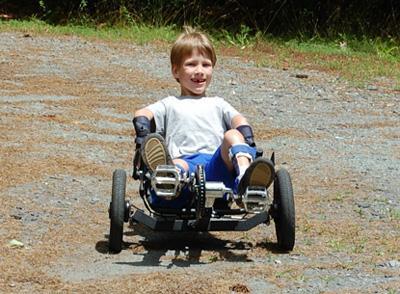
Dec. 21, 2012
Top 10 VCU Research Stories of 2012
Share this story
Virginia Commonwealth University researchers, scientists, faculty and staff have made 2012 a prolific year in terms of important discoveries impacting medicine and health, business, engineering, arts and life sciences. VCU showed a significant increase in research and development expenditures in both federal and total spending categories, elevating the university to a Top 100 institution in both of these prestigious National Science Foundation rankings.
VCU boasts more than $260 million in sponsored research, bringing together faculty experts and student scholars to collaborate across multiple disciplines. VCU is also part of a national consortium of 61 academic research institutions working to turn laboratory discoveries into treatments for patients through a Clinical and Translational Science Award (CTSA) from the National Institutes of Health’s National Center for Advancing Translational Science.
The following are VCU’s top 10 research stories of 2012.
1) Continuing its mission to improve survival and the quality of life of critical illness and injury victims, the VCU Reanimation Engineering Science Center was awarded a $5.57 million grant from the U.S. Army Medical Research and Material Command, Combat Casualty Care Research Program. The grant will fund a study examining plasma versus saline as the most appropriate resuscitation fluid given to victims of critical injury by first contact emergency medical services personnel. http://www.news.vcu.edu/
news/VCURES_Receives_55_Million_Grant
_from_US_Army
2) Man’s best friend may make a positive difference in the workplace by reducing stress and making the job more satisfying for other employees, according to a VCU study. Stress is a major contributor to employee absenteeism, morale and burnout and results in significant loss of productivity and resources. A preliminary study, published in the March issue of the International Journal of Workplace Health Management, found that dogs in the workplace may buffer the impact of stress during the workday.http://www.news.vcu.edu
/news/Benefits_of_Taking_Fido_to_Work_
May_Not_Be_Far_Fetched
3) Bird enthusiasts around the globe had the opportunity to catch a glimpse of life as a bald eagle through a live streaming video. Sixteen nests along the James River were monitored via eagle nest cam by researchers with the Center for Conservation Biology, a partnership between researchers at the College of William and Mary and VCU. This team of researchers is working toward restoration and management of the bald eagle in Virginia.http://www.news.vcu.edu/
news/Bald_Eagle_Pair_Ready_
for_Their_CloseUp
4) The National Institutes of Health’s Human Microbiome Project Consortium, which includes more than 200 investigators from nearly 80 multidisciplinary research institutions, including VCU, has mapped for the first time the normal microbrial makeup of healthy humans. The project has enabled researchers to gain a more complete picture of the community of microorganisms inhabiting the human body and advance knowledge about health and susceptibility to a number of diseases. Ultimately, this may help researchers develop strategies for new therapies that manipulate the human microbiome and improve human health in the future.http://www.news.vcu.edu/news/NIH_Human_Microbiome_Project_Defines_Normal_Bacteria_Makeup_of
5) A national team of researchers, including scientists from VCU, has developed a new tool to study and explain how the brain works – the first map of the surface of the brain based on the basis of genetic information. Although there are several established maps of the brain that show the different regions, they have been developed based on the general structure of lobes and folds, or on the basis of apparent function of different regions. This new map is the first to be based on genetic information. http://www.news.vcu.edu/news/A_GeneticsBased_Map_of_the_Brain
6) VCU scientists have developed a “sponge-like” porous material – just one gram of this material is equal to the surface area of 11 tennis courts – to purify natural gas and store hydrogen gas to be used in clean energy applications such as fuel cells that generate electricity and water with zero emission. http://www.news.vcu.edu/news/On_Our_Way_to_Clean_Energy
7) VCU School of Medicine researchers have identified the “keys” and “doors” of a bacterium responsible for a series of tick-transmitted diseases. These findings may point researchers toward the development of a single vaccine that protects against members of an entire family of bacteria that cause disease in humans, domestic animals and livestock. http://www.news.vcu.edu/news/Researchers_Uncover_Molecular_Basis_of_Infection_of_TickTransmitted
8) Researchers at VCU Massey Cancer Center reported promising results from laboratory and animal experiments involving a new combination therapy for multiple myeloma, the second-most common form of blood cancer. http://www.news.vcu.edu/news/Scientists_Devise_New_Strategy_to_Destroy_Multiple_Myeloma
9) VCU researchers and students make one boy’s dream to ride a bike come true. Aaron Nalle had a wish. He wanted to ride a bike just like his big brothers. But for Aaron, riding a bike was complicated. The 7-year-old was born with arthrogyposis, a congenital, nonprogressive condition that severely limits movements of joints. What started with a personal project of a physical therapy doctoral student transformed into a service-learning research project that soon involved a number of VCU students and faculty from across disciplines. http://www.news.vcu.edu/news/Aarons_Wish
10) VCU received a Grand Challenges Explorations Grant funded by the Bill and Melinda Gates Foundation. Researchers from the VCU Institute for Women’s Health, VCU schools of Medicine, Nursing, and World Studies in the VCU College of Humanities and Sciences, will work with two community partners in Segou, Mali, to pursue an innovative global health and development research project, titled “Reducing Harmful Inflammation and Attenuating Immune System Deterioration in HIV-Infected Malian Women.” http://www.news.vcu.edu/news/VCU_Receives_Grand_Challenges_Explorations_Grant
Subscribe to the weekly VCU News email newsletter at http://newsletter.news.vcu.edu/ and receive a selection of stories, videos, photos, news clips and event listings in your inbox every Thursday.
Subscribe to VCU News
Subscribe to VCU News at newsletter.vcu.edu and receive a selection of stories, videos, photos, news clips and event listings in your inbox.









